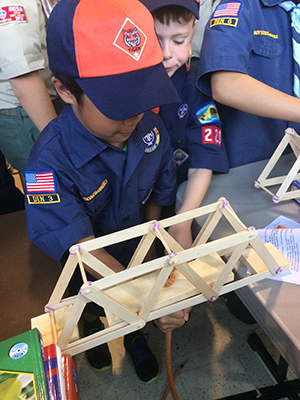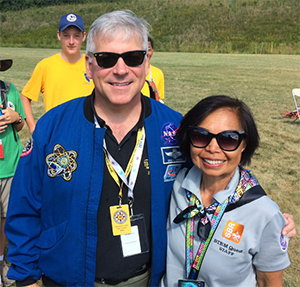Scout Me In! Progressing STEM In Scouting with Caroline Gochoco-Tsuyuki
PASCO Curriculum Specialist, Caroline Gochoco-Tsuyuki on Progressing STEM in Scouting
I became involved with Scouting in 2014, when my son joined a local troop in Lafayette. It was easy to reason that I was there as his chauffeur, but really I was thinking, “Why should he have all the fun?”
Today, I serve as an Assistant Scoutmaster to a female Scout troop and as a member of the Council STEM Committee. On a higher level, I am a Board Member of the newly formed Golden Gate Area Council, a product of the merger between Alameda County, the SF Bay Area, and Mount Diablo-Silverado Councils. I also serve as a member of the National STEM Advisory Committee for the Boy Scouts of America.

My work in inculcating STEM into Scouting began with the creation of a STEM-in-a-Box program. I wrote curricula for elementary through high school-age Scouts, which was packaged into boxed activities that dens, packs, and troops could check out of the council office to use for their meetings and group activities. The kits cover a broad selection of subjects, including projectiles, bridge building, oil spill clean-ups, electrical circuitry, and bunjee mathematics. The Council adopted the national STEM NOVA Awards program, which runs parallel to the classic Eagle Scout rank achievement. Scouts interested in STEM can advance through a series of NOVA Awards to reach the Supernova level. To date, I have mentored six Supernova Scouts. NESA, the National Eagle Scout Association, has been so dedicated to STEM in Scouting that it currently offers several $50,000 college scholarships to Eagle Scouts pursuing STEM majors in college.
My summers are heavily invested in progressing STEM in Scouting. In 2017, my friends at Magnitude.io (Berkeley), CASIS, and I brought space technology education to the National Scout Jamboree by launching CANSAT, a satellite the size of a soda can, into the stratosphere. Our Scouts programmed the telemetry, calculated ascent rates and payload mass, ran experiments, and recorded live video of the Earth’s curvature. They even used NOAA information and GPS to pinpoint where the payload would land. In 2019, I once again collaborated with Greg Johnson, past director of CASIS and former ISS astronaut, to coordinate a live meet-up between Scouts and International Space Station astronauts at the World Scout Jamboree in West Virginia.

This summer, the STEM Committee is going all out on virtual STEM Exploration camps for Scouts of all ages. For the Cub Scouts, we are teaching archeology, astronomy, coding and mathematics camps. For the older Scouts, we are offering STEM workshops on projectiles, alternative energy vehicles, programming, hydrology, agriculture and genetics. Finally, a consortium comprised of UCSF Medical School researchers - one hydrologist, one naturalist, and an educator (myself) - was formed to teach an integrated science workshop entitled “Anthropogenic Global Change” to Scouts who are rising high school seniors. The workshop takes facets of chemistry, materials science, geology, bioinformatics, biodiversity, sustainability and environmental science and introduces an integrated, “big picture” approach to critical thinking in research. It aims to illustrate that science in the modern age does not exist in a vacuum; instead, it must be the product of a holistic approach to learning.
— Caroline Gochoco-Tsuyuki, Curriculum Specialist for PASCO

